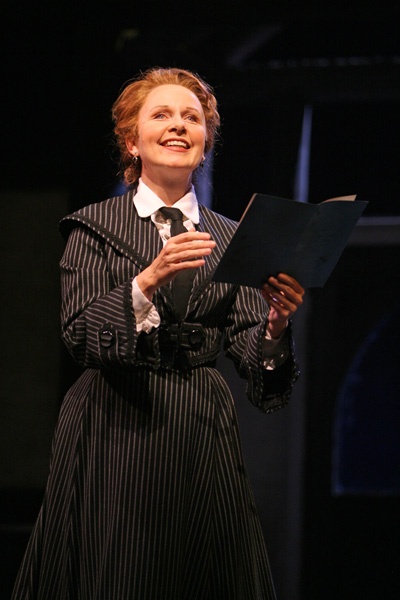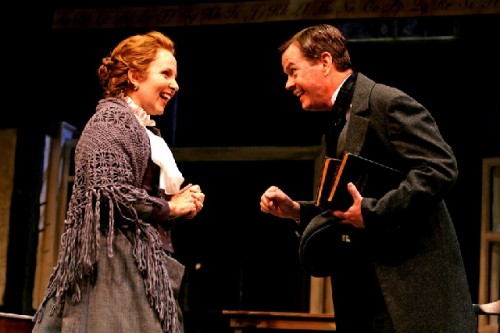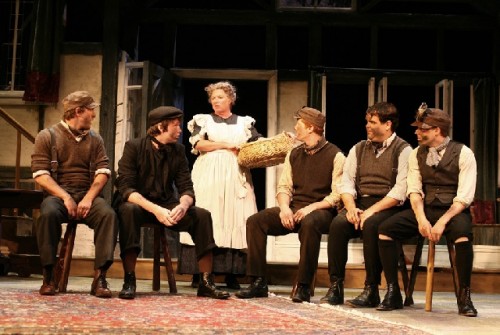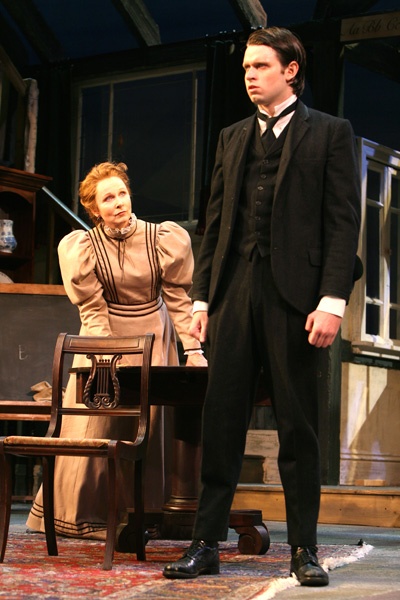The Corn is Green at Williamstown Theatre Festival
Kate Burton Stars with Her Son Morgan Ritchie
By: Charles Giuliano - Aug 03, 2007
The Corn is Green
By Emlyn Williams (1938) Directed by Nicholas Martin. Sets, James Noone. Costumes, Jeff Mahshie. Lights, Frances Aronson. Sound, Drew Levy. Production Stage Manager, Stephen M. Kraus. Production Manager, Michael Wade. Casting, Tara Rubin Casting. Cast in order of appearance: Rod McLachlan (John Goronwy Jones). Kathy McCafferty (Miss Ronberry), Blake Segal (Idwal Morris), Amanda Leigh Cobb (Sarah Pugh), Patrick James Lynch (A Groom), Dylan Baker (The Squire), Ginnifer Goodwin (Bessy Watty), Becky Ann Baker (Mrs. Watty), Kate Burton (Miss Moffat), Morgan Ritchie (Morgan Evans), Greg Hildreth (Robbart Robbatch), Barnett Cohen (Glyn Thomas), Jordan Dean (Will Hughes), Joe Tippett (John Owen), Tom Bloom (Old Tom). The Williamstown Theatre Festival, August 1-12.
http://www.wtfestival.org
Earlier this season we reviewed Kate Burton starring in Anton Chekhov's, The Cherry Orchard, directed by Nicholas Martin for the Huntington Theatre in Boston. They are working together again this summer in the rarely produced, 1938 autobiographical play by Emlyn Williams, The Corn is Green, which opened last night at the Williamstown Theatre Festival where it remains on view through August 12.
Of course there is no comparison between the depth of Chekov's great masterpiece and the far more limited dimension of the Williams play which has at its core a very strong and independent woman, Miss Moffat, a spinster who has come into a modest inheritance and wants to do the good work of bringing education to the wretched children of a Welsh mining town, Glansarno, set in the latter part of the 19th century. The production is intended to feature the remarkable skills of Kate Burton who is one of the greatest performers of her generation. Any time we view her on stage, or the small screen where she plays a cameo as Dr. Grey (the elder) on the hit show Grey's Anatomy, it is always a riveting experience. It is also her special gift to make the actors that surround her on stage rise to their greatest potential. In the production she is paired with the developing talent of her gifted son, Morgan Ritchie, as her prize pupil and hope of the village, Morgan Evans.
The play was first produced in 1940 and ran for 477 performances. There was a revival in 1943, both productions starring the legendary Ethel Barrymore, which ran for 56 performances. Bette Davis, who was of Welsh descent, was a star on the Warner Brothers' lot when she portrayed Miss Mofatt in the 1945 film which earned an Academy Award nomination for best supporting actor for John Dall as Morgan Evans. And for Best Supporting Actress for Joan Lorring as Betty Watty, the girl who got pregnant after a one night stand, who threatens to ruin his life. In the late 1970s Davis attempted to revise the play as a musical but it never made it to Broadway. There was a 1979 made for TV movie directed by George Cukor which starred Katherine Hepburn. And a 1983 revival with Cicely Tyson as Miss Moffatt in an odd rewrite set in the South which ran for 21 previews and just 32 performances. It was regarded as too dated by critics.
Which indeed it is. The strong independence and feminism of Miss Moffat, who tells Miss Ronberry, quite proudly. that she has never loved a man and doesn't need one to boot, seems more quaint than riveting. That opinion surely turns no heads and floats no boats today. So it is a bit of a stretch for the audience to reach back and accept with enthusiasm issues and attitudes which had more resonance in the 1940s than they do today.
Why then dust off a chestnut which was dismissed almost a generation ago? Has anything changed? Well, perhaps. Because we have achieved such distance from the themes of this play it is possible to view the work as an icon of history. There is the other truth that there are too few great roles and star vehicles for women of Burton's age and experience. Since the options are scarce all the more reason to take a chance on a play that is so obviously past its prime.
We would have to say that here in Williamstown all involved have truly given it the old college try. The production, built around the formidable Ms Burton, is by far the centerpiece of the season to date. The fact that this play works to its full potential is entirely due to the power of Burton's performance and the direction of Nicholas Martin. Her every gesture and movement conveys the full meaning of the script. She is always in command of her body and how it impacts the space that surround her. There is indeed a magic when Burton and Martin work together.
Another perk of attending a season of WTF is to observe how some of the actors stay on during the summer and are cast in several roles. Kathy McCafferty as the unmarried Miss Ronberry, who is recruited as a fellow teacher by Miss Moffatt, is far more subtle and effective in this role than as her over the top performance as the prostitute girl friend of a condemned man in Front Page. The blustering and bellowing publisher of that play, Rod McLachlan, is given a very different and rather diminished temperature as the born again friend and supporter of Miss Moffatt, John Goronwy Jones.
It is particularly daunting in a festival format when shows run for only two weeks and there is limited rehearsal time. Keeping up with the pace and energy is demanding even for those attending and writing about it. But there is also an incredible feeling of being truly embedded in theatre as a living and breathing organism. We return each week ready for new experiences and discoveries.
But in that all too human context there are inevitable screw ups. Last night the lighting cues of Frances Aronson were a disaster. The spots didn't manage to follow the actors and became far too conspicuous. Then there was a gasp from the audience during a terrible gaff as the house lights started to come on and off. Good grief. There were also some blown lines that indicated that the company might well have profited by one more tech rehearsal and another dress rehearsal. I am sure these issues will be resolved after the opening night complications.
Many of the elements of the production were outstanding including a great set by James Noone. There was the task of transforming a generic late nineteenth century living room in a comfortably scaled, modest, country house into a crowded classroom. The intervals of traditional Welsh music while prerecorded help to set an ethnic mood. There was also a fine moment when Miss Ronberry led the village people in song. The costumes by Jeff Mahshie were appropriate. Ms Burton had a number of changes, as did Ms Ronberry, and the dressing of the wonderful Squire (Dylan Baker), the sexist dolt who owns the village, added just the right accent and touch to enhance his role. Mashie's crew must have been sewing late into the night to dress this period play.
Initially, Miss Moffatt scorches the Squire with withering sarcasm when he opposes her plans to acquire a barn in which to install her school. Later, she twists him around her little finger with deft feminine charm to help in a plan for the gifted young miner, Morgan Evans, to win a scholarship to Oxford. Here Williams was writing about his own experience of being raised up out of ignorance and poverty by a similarly dedicated Miss Cooke.
Some of the lesser parts were performed effectively. Becky Ann Baker got the biggest laughs of the evening as the former artful dodger and single mother, Mrs. Watty, of the town tramp Bessie Watty (Ginnifer Goodwin). She is one of the reclamation projects of Miss Moffat but can't resist her skills at separating people from their watches and jewelry. She never loved or wanted her daughter who she doesn't get along with. Ditto for her daughter who has given birth to, but is only too willing to get rid of, her child by Morgan. Either she will ruin his life by forcing him into marriage or pass the bastard off to Miss Moffat who ultimately adopts the unwanted baby so Morgan can make it on to Oxford.
The young actress Ginnifer Goodwin is regarded as a rising star but here I found her merely adequate. The transformation from bad girl and poor student, seducer of Morgan, and then self serving train wreck was not handled smoothly or with much credible authority. The final scene where she plans to bring everyone down with her in the attempt to get Morgan to give a name to her baby is just overplayed. It didn't help that Mashie dressed her like a French whore. The costume was a cartoon and a sight gag.
This production will be long and fondly remembered for bringing together mother and son. Burton was acting and playing a role when she ordered Morgan to do his homework and gave him a stern bit of advice regarding his life and prospects. One strongly sensed that the mood and tone of those exchanges reflect their actual family life. The intimacy and love that Burton conveyed, both as consummate professional, and real life mother were truly compelling. Ritchie stretched the limits of his experience to keep up with her. It was a rare and revealing moment. At the end of the play they walked off embracing. They looked absolutely radiant.






